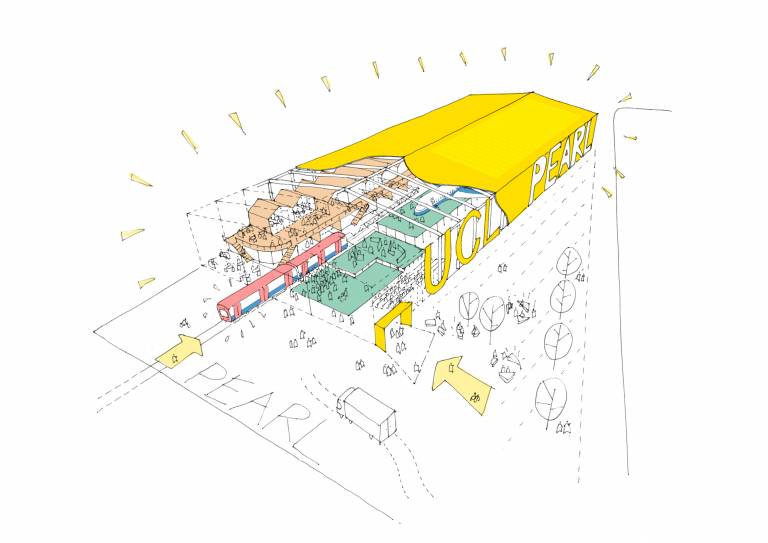World-leading PEARL environment research lab receives £38m UCL investment
11 April 2019
Significant UCL financial backing was confirmed in late 2018 for the Department’s Person-Environment-Activity Research Laboratory (PEARL).

Significant UCL financial backing was confirmed in late 2018 for the Department’s Person-Environment-Activity Research Laboratory (PEARL). The £38m worth of investment will join the £9m already invested by the UK Government through UKCRIC (The UK Collaboratorium for Research on Infrastructure and Cities), signifying an exciting commitment to the dynamic research and learning potential across engineering, design, neurology, psychology, health and the arts that PEARL has to offer.
A unique laboratory designed to explore how people interact with their environments, PEARL builds on the research of PAMELA, the Department of Civil, Environmental and Geomatic Engineering’s (CEGE) existing pedestrian accessibility and movement laboratory.
PEARL is set to take the research capabilities of PAMELA one stage further. With a site earmarked in east London, PEARL will be a huge complex – 9,500 square metres overall, including vastly increased laboratory space, and the potential to replicate environments even more closely than before. UCL researchers and students will be able to study interactions at the micro-scale (i.e. brain activity), and at the macro-scale, (i.e. studying the behaviour of crowds in static or moving environments), helping to make the design of such environments more effective for safety and wellbeing.
Professor Nick Tyler, Chadwick Chair of Civil Engineering in CEGE, and Director of the UCL Centre for Transport Studies, notes that a laboratory such as PEARL is needed “to build on all the good work of PAMELA. PEARL will be able to facilitate scenarios much more realistically; around a thousand loud speakers will be able to accurately imitate real-life situations – for example, how people react when a noise comes from the corner of a space rather than the middle – and the effects of different acoustic properties of different environments. Even scents and smells – such as gas leaks – will be realistically imitated. This is sophistication on a level beyond PAMELA, and as there is already nothing like PAMELA in the world, PEARL presents a phenomenal research and learning opportunity.”
A new suite of innovative interdisciplinary postgraduate programmes are set to take advantage of PEARL, and the laboratory will be used by researchers from a host of disciplines, including neurosciences, engineering and the arts. With a scheduled completion date of 2021, Professor Stella Bruzzi, Dean of UCL’s Faculty of Arts & Humanities, is excited by the myriad opportunities the new facility presents, outlining how PEARL “could for us be a basic black box backdrop: a film or performance set which we could configure as required, to create a multi-sensorial amphitheatre… as a media performance space PEARL opens up huge possibilities for us.”
Prof Tyler explains that the team behind PEARL are also “very keen for the local community to feel like the laboratory space is theirs. It is hoped that PEARL will provide plenty of opportunity for new apprentice roles, outreach and community engagement.”
CEGE’s new Head of Department, Professor José Torero, describes himself as “delighted by the PEARL initiative.” A world-renowned fire safety expert who recently gave expert evidence at the Grenfell Tower Inquiry, Prof Torero explains how PEARL has the potential to aid understanding of safer interactions with space in disaster situations. He notes how the "interactions between people and infrastructure are often poorly understood. This became evident in the Grenfell Tower tragedy, where occupants and firefighters proceeded in a manner that was inconsistent with the behaviour of the building. Social factors, public policies and engineering technologies interacted in an unforeseeable manner to result in an undesirable outcome. I see PEARL as a pivotal resource in research and education at the very cutting edge - a place where UCL is uniquely placed to capitalise on a global scale."
Links
- PEARL
- UKCRIC
- PAMELA
- UCL Department of Civil, Environmental and Geomatic Engineering
- Prof Nick Tyler
- UCL Centre for Transport Studies
- Prof Stella Bruzzi
- UCL Faculty of Arts & Humanities
Image
- PEARL Concept Sketch 4. Credit: UCL Centre for Transport Studies
 Close
Close

